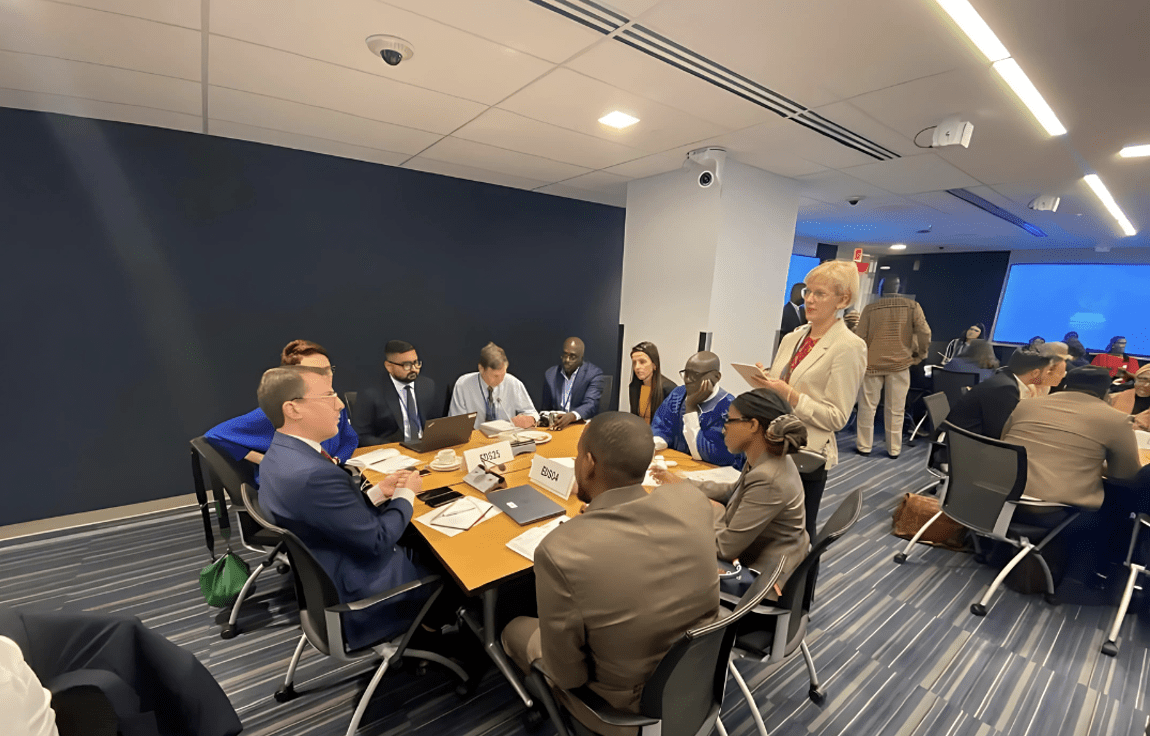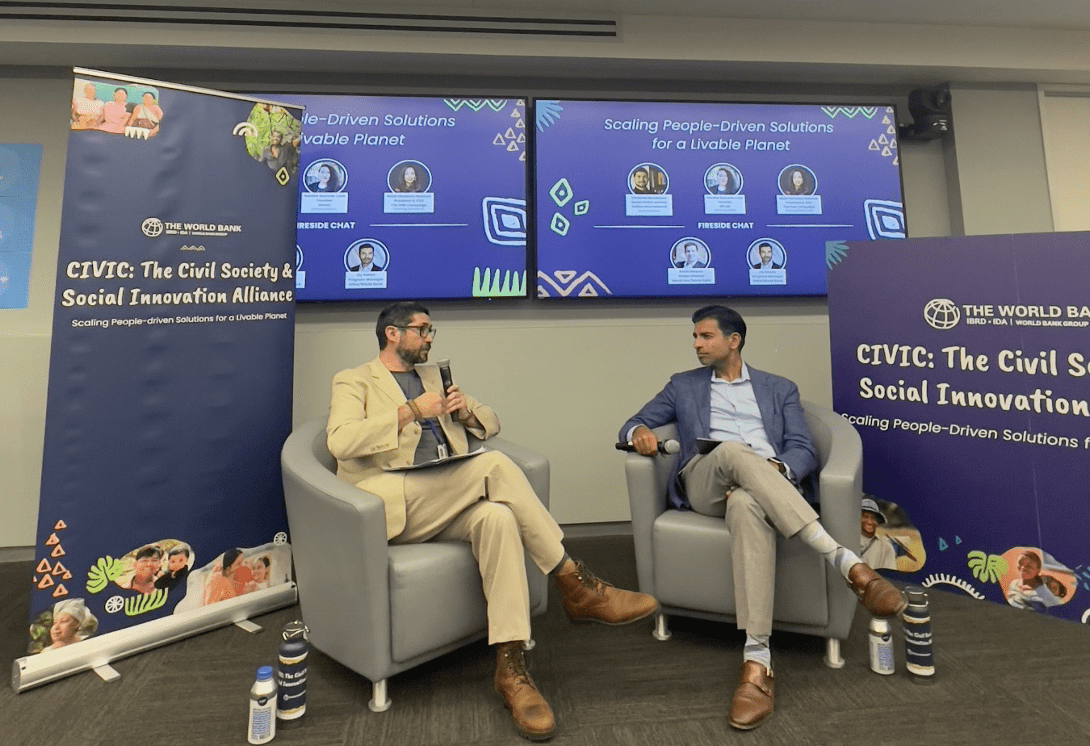Trust at Speed: A Hybrid Funding Offer for the IMF-World Bank
 Civil Society Roundtable with World Bank Group Board of Directors. The author second from left, top row/Anil Wasif
Civil Society Roundtable with World Bank Group Board of Directors. The author second from left, top row/Anil Wasif
By Anil Wasif
October 30, 2024
My board knows I hold fast to two principles: speed and accountability. But at this year’s World Bank-IMF Annual Meetings, the tension between the two was unavoidable, especially at the Civil Society Policy Forum. In urgent conversations around health care, youth job creation, and climate funding, a critical truth became clear: billions are needed to reach billions, but time isn’t on our side.
Enter hybrid CSOs—a category that sidesteps the conventional first-, second-, or third-tier labels of development organizations. Often referred to as “transnational civil society organizations” (TCSOs) or “multi-scalar civil society organizations, these groups operate seamlessly across borders, blending the institutional rigor of global NGOs with the grassroots knowledge of local networks. In conversations with leaders of such organizations, a new model for development emerged: hybrid CSOs leverage both stringent administrative compliance and cultural sensitivity, effectively bridging the gap between Global North funders and on-the-ground communities. Equipped to deliver with both speed and accountability, these organizations are increasingly essential in high-stakes initiatives where both time and trust are critical. Their talent pool often lies in first- or second-generation citizens, migrants and diaspora communities – an extremely hard working and accountability-seeking group of people, anywhere in the world.
Take, for example, Shujog, based in Singapore, which channels impact investments to Asian communities. Or Ubaxa Caasimada in Somalia, where diaspora backing enables youth engagement and civic projects that reflect community priorities while meeting international standards. Similarly, Diaspora Action Australia (DAA)—founded by refugees and migrants—supports initiatives across Africa and the Middle East, aligning diaspora-led efforts with global accountability frameworks. Well, even GlobalGiving, is a U.S.-based non-profit that enables local grassroots solutions to access direct international funding, fostering transparency for donors while allowing community-driven projects to flourish. As World Bank President Ajay Banga emphasized, “In this rapidly changing world, we need institutions that combine local insights with the ability to move at a global pace.” These hybrid CSOs stand ready to meet this need, balancing rapid response capabilities with the standards of global funders. And the Bretton Woods institutions could consider embracing them.
Sending Billions to Billions in Record Time
This year’s annual meetings spotlighted the need for billions in funding to reach billions of lives. From healthcare access to addressing climate vulnerability, challenges on the ground demand solutions that combine speed with rigorous oversight. Hybrid CSOs are uniquely positioned to meet these requirements because they bring a rare blend of strengths to the table. They’re tech-savvy, well-educated, and consistently meet strict regulatory and reporting standards to align with both local and international compliance demands.
Unlike many traditional organizations, hybrid CSOs rigorously report on every dollar spent to satisfy the regulatory requirements of the countries they operate in and those of their funders. This dual accountability means that they’re not just channeling funds swiftly but are ensuring meticulous tracking, a necessary feature when navigating development finance.
Their technological edge is equally critical. Equipped with digital finance tools, hybrid CSOs bypass bottlenecks to deliver funds directly to communities through secure mobile cash transfers or blockchain systems. For instance, organizations like GlobalGiving and Diaspora Action Australia demonstrate how hybrid CSOs effectively manage and report on funds in real-time, bringing a level of transparency that standard models often miss. An executive at the IMF meetings put it aptly: “Technology enables transparency and speed, [allowing us] to see the impact almost in real time.”
Moreover, hybrid CSOs understand the importance of financial literacy among their recipients, especially those in regions without NGO licenses or corporate banking structures. These organizations often educate local communities in basic finance, empowering them to manage funds independently—a foundational step for sustainable impact. Bridging regulatory compliance and local insights, hybrid CSOs are increasingly recognized as ideal partners for global development. By combining speed with accountability, they bridge the gap between funders in the Global North and the communities they serve in the Global South, ensuring funds are used both wisely and efficiently.
Establishing Trust by Culture
Hybrid CSOs hold a unique transliteration advantage, bridging not only language gaps but also the divergent perspectives of global funders and local communities. In table-side conversations at this year’s annual meetings, the World Bank board highlighted the value of organizations capable of aligning project goals with the nuanced realities of local governance and social dynamics. This skill goes beyond standard translation; hybrid CSOs know how to reframe complex requirements into actionable, community-centered projects, tailoring initiatives that meet donor expectations while addressing community needs directly.
The transliteration flow works both ways. Hybrid CSOs bring a deep, intuitive understanding of their communities, allowing them to recognize legitimate needs and filter out impractical or mismatched directives from external partners. As an executive at the forum emphasized, “Digitalization is transforming governance. Countries with robust data systems saw faster COVID-19 response times. It’s clear that technology enables transparency and speed.” Hybrid CSOs, often tech-savvy and well-versed in local needs, use data-driven tools that meet international transparency standards while ensuring relevance and responsiveness at the grassroots level.
This grounded approach is essential when working across diverse cultural and social terrains, where empathy and understanding local “realities” are as important as the funding itself. By fusing donor frameworks with local insight, hybrid CSOs bolster trust, effectively channeling funds and ideas to where they’re needed most. This dual capacity to navigate both global compliance and community complexities makes them indispensable in high-stakes projects where impact and urgency must go hand in hand.
Accountability and the Role of CIVIC
 Launch Preview of CIVIC: The Civil Society and Social Innovation Alliance/Anil Wasif
Launch Preview of CIVIC: The Civil Society and Social Innovation Alliance/Anil Wasif
The World Bank’s CIVIC: The Civil Society & Social Innovation Alliance initiative is a promising new step for incorporating community-driven perspectives into development policy, especially for organizations in challenging, under-resourced regions. To succeed, CIVIC must be democratically structured and accessible, allowing diverse CSOs, including smaller, dynamic organizations, to contribute vital insights. As a World Bank board member remarked, “Organizations close enough to see the needs and agile enough to address them” provide insights that institutional decision-makers often lack.
For hybrid CSOs, CIVIC is an opportunity to shape policies that resonate with Global South realities. These organizations, grounded in both global standards and local sensibilities, bring strategic oversight and grassroots understanding, making them ideal partners in crafting solutions that address urgent community needs. Their unique capacity to bridge compliance and cultural relevance ensures that development efforts are contextually aware and locally impactful.
To this end, we found ourselves resonating with Ndidi Nwuneli from the launch panel who reiterated her version of the renowned African proverb: “If you want to go fast, go alone. If you want to go far, go together.” We need to scale what works by leaving our egos and logos at the door and working in true partnerships.
Worth a Shot
As the World Bank and IMF consider ways to amplify their impact, hybrid CSOs offer a model that balances accountability with agility, helping to de-risk investments in complex, high-need regions. Equipped to operate under strict compliance, these CSOs mitigate risk by anticipating regional challenges and ensuring resources reach beneficiaries effectively.
A targeted pilot project with hybrid CSOs through CIVIC could help the IMF and World Bank test direct funding effectiveness in sectors such as health care, youth empowerment, and climate resilience, leveraging the digital finance tools that hybrid CSOs already employ for transparent, efficient fund distribution. By starting with sector-specific pilots, the Bank and IMF can gather invaluable data on the operational efficiencies, risks, and impacts of these partnerships, without altering their existing frameworks.
If successful, this pilot could become a scalable model, providing the Bank and IMF with a flexible, responsive approach that aligns with their core values of accountability and impact. This structure could bridge the gap between large-scale funding initiatives and local expertise, fostering impactful, community-driven solutions in underserved areas where development finance is most critical.
Policy Contributing Writer Anil Wasif is Manager of Research at Infrastructure Ontario. He sits on the advisory board of the Max Bell School at McGill University and the Governing Council at the University of Toronto. He is Trustee and Director of Strategy at BacharLorai and is its Official Civil Society Representative to the United Nations and the World Bank Group.
His opinions are his own, and do not reflect the views of any organizations with which he is affiliated.
